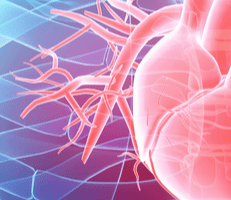Atrial Fibrillation

Phoenix Heart
Cardiologists located in Glendale, Goodyear, Scottsdale, Anthem, Black Canyon City & Avondale, AZ
Atrial fibrillation, or A-fib, can place you at high risk for heart attack and stroke if left untreated. The medical team at Phoenix Heart is knowledgeable and well-equipped to diagnose, treat, and manage heart rhythm problems, including atrial fibrillation. For an expert evaluation and treatment plan for your A-fib, call today or book an appointment online with one of their locations in Glendale, Goodyear, Anthem, Buckeye, Laveen, Cottonwood, and Black Canyon City, Arizona.
Atrial Fibrillation Q & A
What is Atrial Fibrillation?
Atrial fibrillation, commonly called A-fib, is a heart rhythm problem that causes the upper chambers of the heart to quiver and get out of sync with the bottom chambers of the heart.
The upper chambers of the heart, called the atria, normally pump immediately before the lower chambers, called ventricles. Synchronized by the heart’s electrical system, the chambers work together to create a constant movement of blood through the heart and lungs, and back to the body.
When your heart rhythm is irregular, blood moves slower and less efficiently, causing blood to pool and potentially clot. Blood clots can travel all over the body, including the brain, lungs, and heart muscle.
What causes Atrial Fibrillation?
Atrial fibrillation is caused by an interruption in the electrical pathway, which may be brought on by damage or strain placed on the heart.
Heart-related conditions that may cause A-fib include:
- Hypertension, or high blood pressure
- Heart valve disease
- Heart attack
- Heart surgery
- Coronary artery disease
- Congestive heart failure
Other possible causes may include:
- High thyroid levels
- Lung disease
- Pneumonia
- Surgery
- Excessive alcohol use, especially binge drinking
- Stimulants, such as caffeine, recreational drugs, or some medications
You may be at higher risk for having atrial fibrillation if you’re obese or if you smoke.
What are Symptoms of A-Fib?
Symptoms of atrial fibrillation may be general in nature and may come and go. You may not realize that your symptoms are related to your heart rhythm. These include:
- Shortness of breath
- Fatigue or tiring easily
- Racing or pounding heart rate
- Dizziness or fainting
- Heart palpitations
- Chest pain or discomfort
Regular cardiac checkups, which may include an EKG or echocardiogram, can help identify A-fib before you have serious complications, such as stroke or heart failure.
How is Atrial Fibrillation Treated?
Once your A-fib has been diagnosed, your Phoenix Heart provider may choose to simply monitor your rhythm regularly.
If your rate isn’t controlled, if you’re symptomatic, or if you have a higher risk of complications, treatment may include:
- Blood-thinning medications
- Rate-controlling medications
- Cardioversion or defibrillation, to shock the heart back into rhythm
- Catheter ablation, a procedure to fix the electrical pathways
- Internal pacemaker, to regulate cardiac rhythm
Your cardiologist takes time to answer your questions related to your risk and your options to treat atrial fibrillation.
For a consultation for your A-fib, call today or book an appointment online with Phoenix Heart.
Cardiology Services
-
 Cardiovascular Labmore info
Cardiovascular Labmore info -
 Congestive Heart Failuremore info
Congestive Heart Failuremore info -
 Electrophysiologymore info
Electrophysiologymore info -
 Heart Attackmore info
Heart Attackmore info -
 Nuclear Medicinemore info
Nuclear Medicinemore info -
 Clinical Researchmore info
Clinical Researchmore info -
 Structural Heart Defectsmore info
Structural Heart Defectsmore info -
 Ultrasound Testingmore info
Ultrasound Testingmore info -
 Echocardiogrammore info
Echocardiogrammore info -
 Vein Centermore info
Vein Centermore info -
 Women’s Heart Healthmore info
Women’s Heart Healthmore info -
 High Blood Pressure/Hypertensionmore info
High Blood Pressure/Hypertensionmore info -
 High Cholesterolmore info
High Cholesterolmore info -
 Coronary Artery Diseasemore info
Coronary Artery Diseasemore info -
 Stress Testingmore info
Stress Testingmore info -
 Weight Lossmore info
Weight Lossmore info -
 Arrhythmiamore info
Arrhythmiamore info -
 Atrial Fibrillationmore info
Atrial Fibrillationmore info -
 Peripheral Vascular Disease (PVD)more info
Peripheral Vascular Disease (PVD)more info -
 Chest Pain/Anginamore info
Chest Pain/Anginamore info -
Lymphedema & Phlebolymphedemamore info
-
Compression Stockingsmore info
-
Diagnostic Testingmore info
-
Interventional Cardiologymore info
-
Peripheral Arterial Diseasemore info
-
Bradycardiamore info
-
Tachycardiamore info
-
Ventricular Fibrillationmore info
-
Weight Management with Enara Healthmore info

Heart Care
Cardiovascular disease, or heart disease, is the leading cause of death for both men and women in the United States. We treat all ranges of conditions that affect the heart.
Learn More
Vein Care
We diagnose and treat a wide variety of conditions, injuries, and diseases related to the veins in the body.
Learn More
Vascular Care
Our cardiologists take a multidisciplinary approach to vascular care. Our care team provides surgical and non-surgical vascular treatment options to keep you healthy.
Learn More
For Patients
Get the information you need before your appointment, access our online portal, forms, prescription refills and more.
Learn More



















